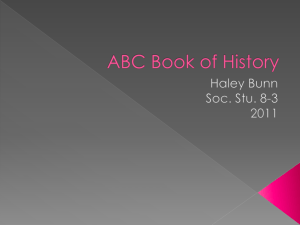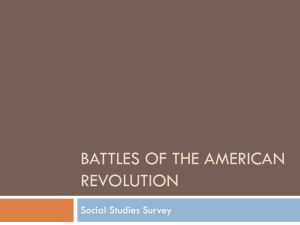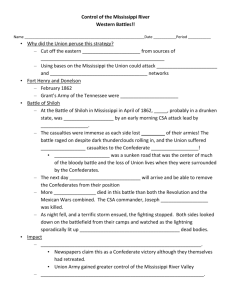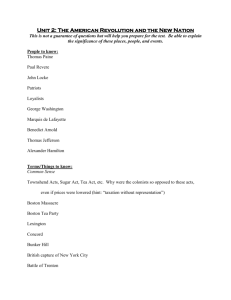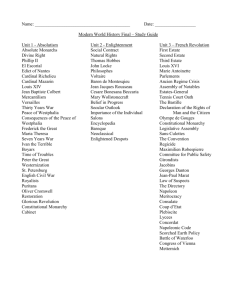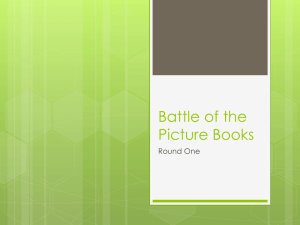ABC Book of History
advertisement
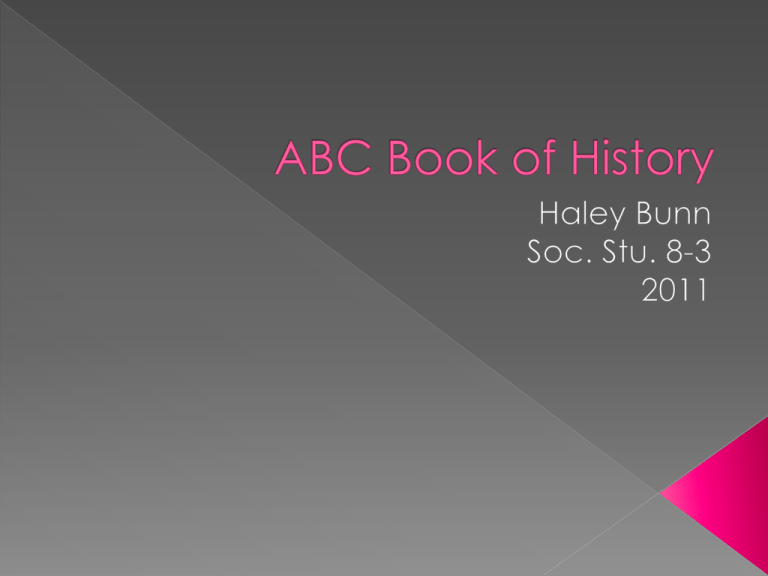
emancipate- to free from slavery. Executive Branchbranch of government , headed by the president, that carries out the Nations law and policies. Emigration- person who leaves a country or region to live elsewhere. Export- to sell goods abroad. Feminist- a person who advocates or is active in promoting women’s rights Frigate- warship Freed Man- a person freed from slavery. Fugitiverunaway or trying to run away Global Warminga steady increase in average world temperature. Guerilla Tacticsreferring to the surprise attacks or raids rather than organized warfare Greenbackpiece of U.S. paper money first issued by the North during the Civil War. Guerrilla Warfare- hit and run technique in fighting a war. Habeas Corpus- legal order for an inquiry to determine whether a person has been lawfully imprisoned. Horizontal Integrationthe combining of competing firms into one corporatism. Holocaust- name given to the mass slaughter of Jews and other groups by the Nazis during World War II Human Rights- rights regarded as belonging to all persons, such as freedom from unlawful imprisonment, torture, and execution. Impressment- forcing people into service, such as the Navy. Interchangeable Partsuniform pieces that can be made in large quantities to replace other identical pieces. Industrial Revolutionchange from an agrarian society to one based on industry which began in Great Britain and spread to the U.S. around 1800. Indian Removal Act- 1830, Jackson sent officials to negotiate treaties with the natives. They wanted to expand the people to the unknown west lands. Jackson, Andrewthe 7th president of the United States; authorized the Indian Removal Act in 1830 Judicial Branchbranch of government, including the federal court system, that interprets the nations laws. Jamestown, Virginia1st permeate settlement in America. (1607) Jones, John Paulfound over the U.S. Navy and said, ‘I have not yet begun to fight. Kansas-Nebraska Act- May 1854; 36 30 N latitude. Kansas free, Nebraska slave state. Kansas, Bleeding- 1856, slave supporters attacked Kansas and that started a mini Civil War. That is how Kansas got its nickname. Key, Fransis Scottlawyer from Baltimore, wrote the National Anthem, became our National Anthem in 1931. Keelboat- Lewis and Clark used a keelboat to travel up the Missouri River. Lafayette, Marquise de- “trained” the men for battle when the American Revolution started, he was a trusted friend of George Washington. Lexington, Massachusetts- where the first shots of the American Revolution were; “The shot heard around the world.” Lewis and Clark Expedition- sent by the president to do research o the new land; first to go from the Pacific to the Atlantic ocean. Louisiana Purchase- 1803; from France for $15 million; Thomas Jefferson bought this land. Madison, Jamesopposed the idea of having a first National Bank, thought t was unconstitutional. Morse Codeinvented by Samuel Morse; on May 24, 1844 Morse demonstrated he could relay a message through wires, this became helpful to the president during the Civil War. Mississippi River- the main and constant supply for the South during the Civil War. M Mayflower Compact- the first formal document written in 1620, that provided law and order to the Plymouth colony. Nineteenth Amendment- 1) the right of citizens of the U.S. to vote shall not be denied or abridged by the U.S. or any state on account of set. 2) congress shall have power by appropriate. Nullify- to cancel or make ineffective. Ninth Amendment- the enumeration in the Constitution, of certain rights, shall not be constructed to deny or disparage other retained by the people. Northwest Passagewater route to Asia through North America sought by European explorers. Ordinance- a law or regulation. Ohio River- river flowing from Allegheny and Monongahela rivers western Pennsylvania into the Mississippi river. Overseer- person who supervises a larger operation or workers. Organ Trail- pioneer trail from independence, Missouri , to the Organ Territory. Persecute-to treat someone harshly because of their beliefs or practices. Propaganda- ideas or information designed and spread to influence opinion. P Pilgrims- Separatists who journeyed to the colonies during the 1600’s for a religious purpose. Patriots- American colonists who were determined to fight the British until American independence was won. Quaker- protestant group of dissenters. Quebec, Battle ofBritish General James Wolfe, led an ambush a surprise sneak attack and defeated the French. Quebec- city in Canada, capital of Quebec of Province, on the St. Lawrence River; first settlement in New France. Quebec Act- 1774; and act of Parliament of Great Britain settling procedures of governance. Railroads- made during the industrial revolution; used in the civil war to get supplies to the North from the North to the South were the North camp. Revolution, Americanfought for Americans to gain independence from England. Rebels- the South during the Civil War; other wise known as the confederacy. Red Coats- nick name for British troops to tell the difference between the people and the troops. Slave- someone who is owned by another; normally African Americans owned by the whites. Scott, Dred- an African American bought by an army doctor in Missouri. s Smuggling- trading illegally with other nations. Secede- to leave or withdraw. Tariff- a tax on imports or exports. Temperance- the use of little or no alcoholic drink. Telegraph- a device or system that uses electric signals to transmit messages by a code over wires. Total War- war on all aspects of an enemy’s life. Unconstitutional- not agreeing or consistent with the Constitution. Union- the North during the Civil War. Underground Railroad- a system that helped enslaved African Americans follow a network of routs out of the South and into the North. Uncle Tom’s Cabin- written by Harriet Beacher Stowe; African Americans to rebel (so to speak) and go to the North. Vicksburg, Battle of-this battle is where the North took control of the Mississippi River. The Mississippi River was important to the South it helped them get supplies around to the troops. Virginia Plan- mainly authorized by James Madison. Called for a two house legislature, chief executive chosen by the legislature, and a court system. Virginia- the state where Jamestown was first settled; where the United States started. Veto- to reject a bill and prevent it from becoming a law. Washington, Georgethe first president of the United States; won the Battle of Saratoga which gave us independence from Great Britain. Washington D.C.District of Columbia; the U.S. Capital. War HawksRepublicans during Madison’s presidency who pressed for war with Britain. Whitney, Eli- invented the cotton gen. X,Y,Z Affair- French Minister sent 3 spies x, y, z and they demanded a bribe and loan for the French from the Americans. Yankee- Union soldier. Yellow Journalism- Yorktown, Virginia- the turning point in the American Revolution; this battle proved to France that the Americans had a chance to win the Battle.
